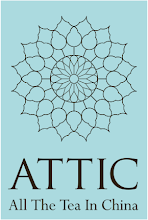
Ti Guan Yin, meaning ‘Iron Goddess of Mercy’, is one China’s most famous and special Oolong teas.
Legend has it that a poor farmer who maintained a dilapidated old temple to the bodhisattva of compassion, Quan Yin, saw her in a dream where she directed him where to look for his reward, which he was to share with the whole community. In the directed location, there stood a solitary tea sprout, which the farmer nurtured like a gift from heaven. Since then the whole region has prospered from the production of this tea.
Traditionally, Ti Guan Yin is served gongfu style (a fine art to tea serving, where the smallest details are carefully monitored to extract the best possible taste from the tea leaves), steeping the tea in a fist sized pot and drinking it from small ‘shot’ cups, often made from fine pottery. When served in this way, it becomes one of the strongest teas available, but still retains its incredible delicacy.
Oolong teas are semi-fermented, sitting between green and black teas in terms of strength and flavour. Because of this, they are amongst the most diverse and complex-tasting teas, ranging from refreshing and delicate emerald greens, to the strong and roasted flavours of near ebony leaves.
Sitting at the greener end of Oolongs, Ti Guan Yin is a fine example of the many levels of flavour this group of tea offers. Its tightly rolled leaves unfurl to a vast volume, allowing them to be re-used several times with little dilution of flavour.
It's one of the teas we frequently fall back on when we need a 'pick me up' during the day, with its rich, strong and refreshing taste, we hope you'll see why it’s considered a gift from the heavens!





There's so much attention given to the Japanese tea ceremony as a spiritual expression and experience. This makes me see that the Chinese have a similar ceremony in their Gong Fu practices, though it's more practical. And Gong Fu is perhaps more on the sensual, natural side though I can't say that necessarily isn't just as spiritual as what the Japanese traditionally do.
ReplyDelete